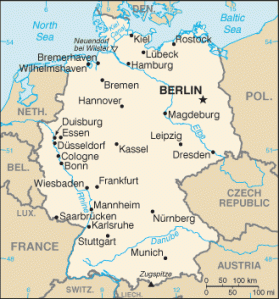
Location- Central Europe. It’s bordering the Baltic Sea and the North Sea. Germany is also located between the Netherlands and Poland which is south of Denmark.
- Where Germany is located is an interesting place to be. Yet I find it kind of harsh even though there can be a lot of changes and other things too.
Area- Total: 357,022 sq km; Country comparison to the world: 63, Land: 348,672 sq km; Water: 8,350 sq km.
- Germany is the 63rd country compared to the world. Also how big it is, I would consider going there but yet I don’t know.
Climate- temperate and marine; cool, cloudy, wet winters and summers; occasional warm mountain (foehn) wind.
- The temperature is kind of coolish cold and yet likely to get cold more often and get sick also.
Natural Resources- coal, lignite, natural gas, iron ore, copper, nickel, uranium, potash, salt, construction materials, timber, arable land.
- They have a lot of resources. The main resource is coal and lignite.
Terran- lowlands in north, uplands in center, Bavarian Alps in south.
Coastline- 2,389 km.
Land Use- Arable Land: 33.13%, Permanent Crops: 0.6%, Other: 66.27%.
- The land is not as arable as the other countries. Plus they have a lot of land on their hands.
Geography Current Issues- “Emissions from coal-burning utilities and industries contribute to air pollution; acid rain, resulting from sulfur dioxide emissions, is damaging forests; pollution in the Baltic Sea from raw sewage and industrial effluents from rivers in eastern Germany; hazardous waste disposal; government established a mechanism for ending the use of nuclear power over the next 15 years; government working to meet EU commitment to identify nature preservation areas in line with the EU’s Flora, Fauna, and Habitat directive.”
- The issues in Germany are more definite then most other things.
Age Structure- 
Median Age- The total: 45.3 years.
Population Growth Rate: -0.2%.
Birth Rate- 8.33 births/1,000 population.
Death Rate- 11.04 deaths/1,000 population.
- The population growth is less than what our country is. But yet there is more of that control to Germany.
Economy- Overview: “The German economy – the fifth largest economy in the world in PPP terms and Europe’s largest – is a leading exporter of machinery, vehicles, chemicals, and household equipment and benefits from a highly skilled labor force. Like its Western European neighbors, Germany faces significant demographic challenges to sustained long-term growth. Low fertility rates and declining net immigration are increasing pressure on the country’s social welfare system and necessitate structural reforms. Reforms launched by the government of Chancellor Gerhard SCHROEDER (1998-2005), deemed necessary to address chronically high unemployment and low average growth, contributed to strong growth in 2006 and 2007 and falling unemployment. These advances, as well as a government subsidized, reduced working hour scheme, help explain the relatively modest increase in unemployment during the 2008-09 recession – the deepest since World War II – and its decrease to 6.0% in 2011. GDP contracted 5.1% in 2009 but grew by 3.6% in 2010, and 2.7% in 2011. The recovery was attributable primarily to rebounding manufacturing orders and exports – increasingly outside the Euro Zone. Germany’s central bank projects that GDP will grow 0.6% in 2012, a reflection of the worsening euro-zone financial crisis and the financial burden it places on Germany as well as falling demand for German exports. Domestic demand is therefore becoming a more significant driver of Germany’s economic expansion. Stimulus and stabilization efforts initiated in 2008 and 2009 and tax cuts introduced in Chancellor Angela MERKEL’s second term increased Germany’s budget deficit to 3.3% in 2010, but slower spending and higher tax revenues reduce the deficit to 1.7% in 2011, below the EU’s 3% limit. A constitutional amendment approved in 2009 limits the federal government to structural deficits of no more than 0.35% of GDP per annum as of 2016. Following the March 2011 Fukushima nuclear disaster, Chancellor Angela Merkel announced in May 2011 that eight of the country’s 17 nuclear reactors would be shut down immediately and the remaining plants would close by 2022. Germany hopes to replace nuclear power with renewable energy. Before the shutdown of the eight reactors, Germany relied on nuclear power for 23% of its energy and 46% of its base-load electrical production.”
- The economy of Germany is more problematic then most other countries in the word.
GDP- $3.55 trillion.
Labor Force- 43.67 million.
Public Debt- 80.6% of GDP (2011 est.), 82.4% of GDP (2010 est.).
- Their GDP is more then what is accounted for.

Flag Description- “Three equal horizontal bands of black (top), red, and gold; these colors have played an important role in German history and can be traced back to the medieval banner of the Holy Roman Emperor – a black eagle with red claws and beak on a gold field.”
- The Flag has a great significance to the Germans in their country. Even though there are most complicated things that are worst then the economy.
Religion- Protestant: 34%, Roman Catholic: 34%, Muslim: 3.7%, unaffiliated or other: 28.3%
- There are more Protestans then most other religions in Germany. I thought that there were more Catholics then Protestants.
https://www.cia.gov/library/publications/the-world-factbook/geos/gm.html


















 “Refugees shout slogans during a protest by asylum seekers calling for fairer treatment from authorities as they pass through Brandenburg Gate in Berlin, October 13, 2012.”
“Refugees shout slogans during a protest by asylum seekers calling for fairer treatment from authorities as they pass through Brandenburg Gate in Berlin, October 13, 2012.” “Asylum seekers stand outside an accommodation at a refugee holding centre in the town of Bad Belzig some 135 km (84 miles) south-west of Berlin, December 12, 2012.”
“Asylum seekers stand outside an accommodation at a refugee holding centre in the town of Bad Belzig some 135 km (84 miles) south-west of Berlin, December 12, 2012.” 




